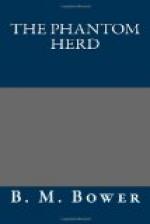“The West—the real honest-to-goodness, twelve-months-in-the-year West,” Luck went on riding his hobby, “has been mighty little used in films. Ever notice that? It’s all gone to shooting, and stealing the full product of all the gold mines in the world, and killing off more bad men than the Lord ever sent a flood to punish. For film purposes, the West consists of one part beautiful maiden in distress, three parts bandit, and two parts hero. Mix these to taste with plenty of swift action and gun-smoke, and serve with bandits all dead or handcuffed and beautiful maiden and hero in lover’s embrace on top. That’s your film West, boys—and how well I know it!” Luck stopped to light a cigarette and to heave a sigh. “I’ve been building film West to order for four years now, and more. Only fun I’ve had, and the best work I’ve done, I did with a bunch of Indians I’ve just taken back to their reservation. For the rest, it’s mostly bunk.”
“Not that stage-driver picture,” Andy dissented. “There wasn’t any bunk about that, old-timer. That was some driving!”
“Some driving, yes. Sure, it was. It was darned good driving, but the same old story doctored up a little. Same old shipment of gold, same old bandits lying in wait, same old hero doing stunts. I ought to know,” he added with a grin. “I wrote the story and did the stunts myself.”
“Well, they were some stunts!” admired Andy with unusual sincerity.
Luck waved aside the compliment and went back to his hobby. “Yes, but the West isn’t just a setting for stunts. I’ve got my story—here,” and he tapped his forehead, which was broad and full and not too high. “I’m going to fire my camera man and get a better one, and I’m going to round me up a bunch of real boys that can get into the story and live it so well they won’t need to do any acting,—boys that can stand a panoram on their work in the saddle. I’ve been getting by with a bunch of freaks that think they’re real riders if they can lope a horse up-grade without falling off backwards. Most of my direction of those actorines has been knowing to a hair how much footage to give ’em without showing how raw their work is.
“They say the public demands a certain grade of rottenness in Western films, but I never believed that, down deep in my heart. I believe the public stands for that stuff because they don’t see any better. This four-reeler I’ve got in mind will sure open the eyes of some producers—or I’ll buy me a five-acre tract in Burbank and raise string beans for a living.”
“I’ve got a patch of string beans,” sighed the Native Son, “that I’ve been sitting up nights with. I don’t know what ails the cussed things. Some kind of little green bug chews on them soon as my back is turned. They ought to be ripe by now—and they aren’t through blossoming. Don’t go into beans, amigo.”
Luck looked at him and laughed. The Native Son, in black and white Angora chaps and cream-colored shirt and silver-filigreed hatband as ornamental touches to his attire, did not look like a man who was greatly worried over his crop of string beans while he rode with a negligent grace away from a glowing sunset. But in these days the West is full of incongruities.




